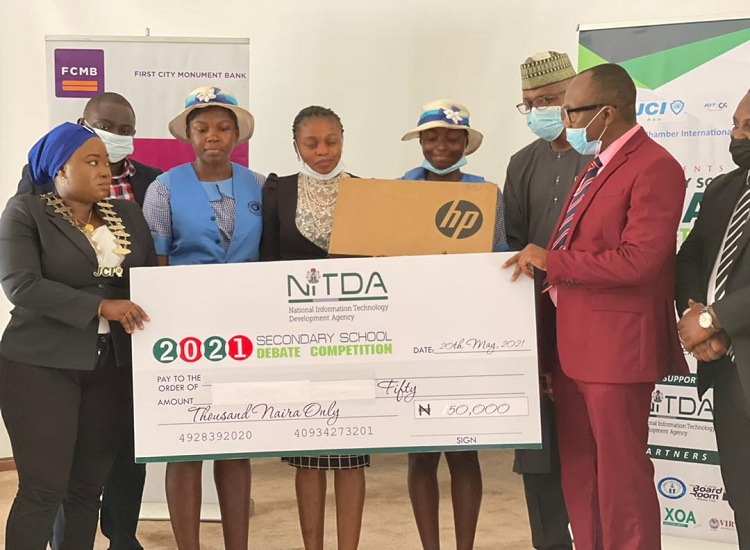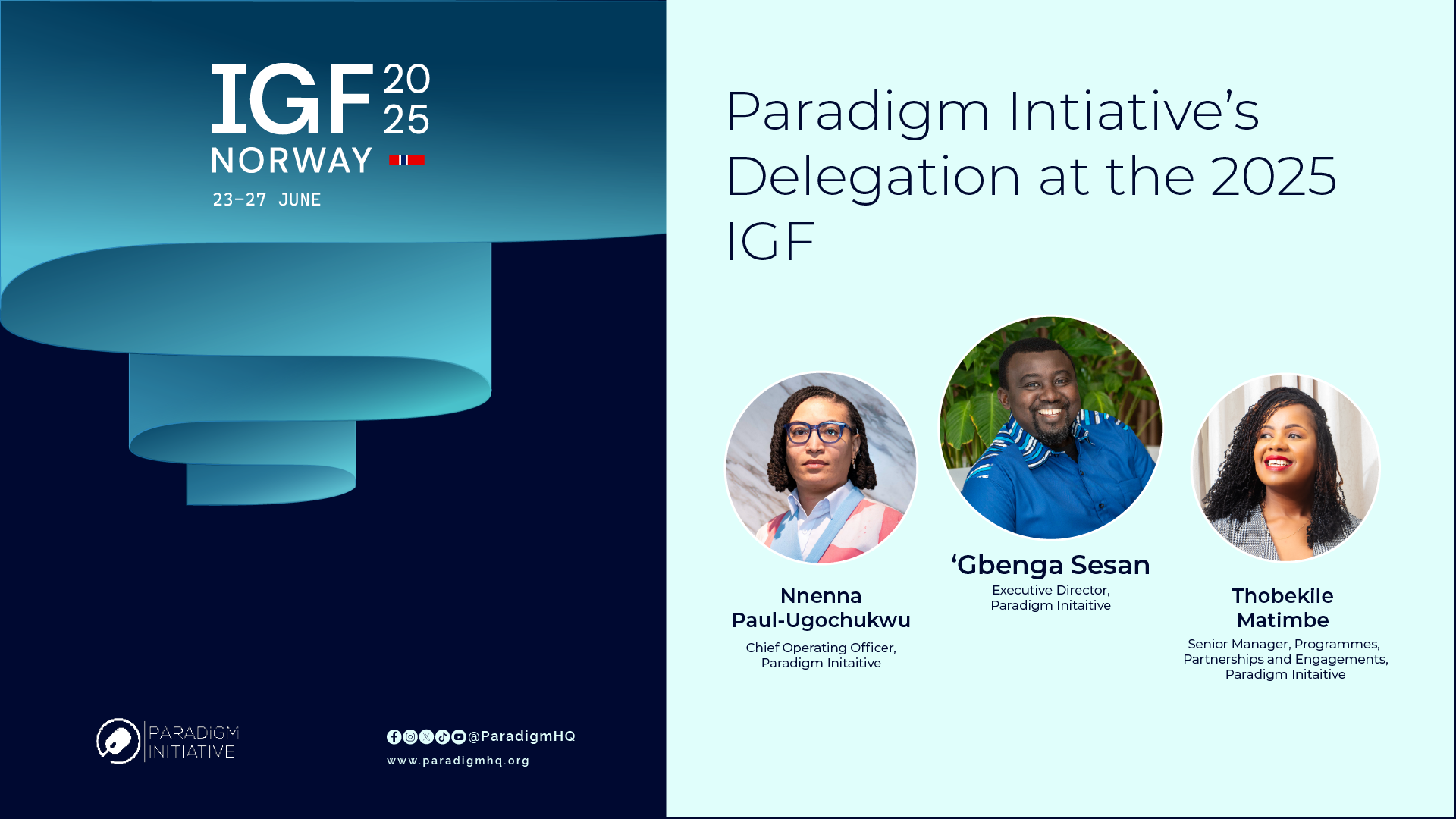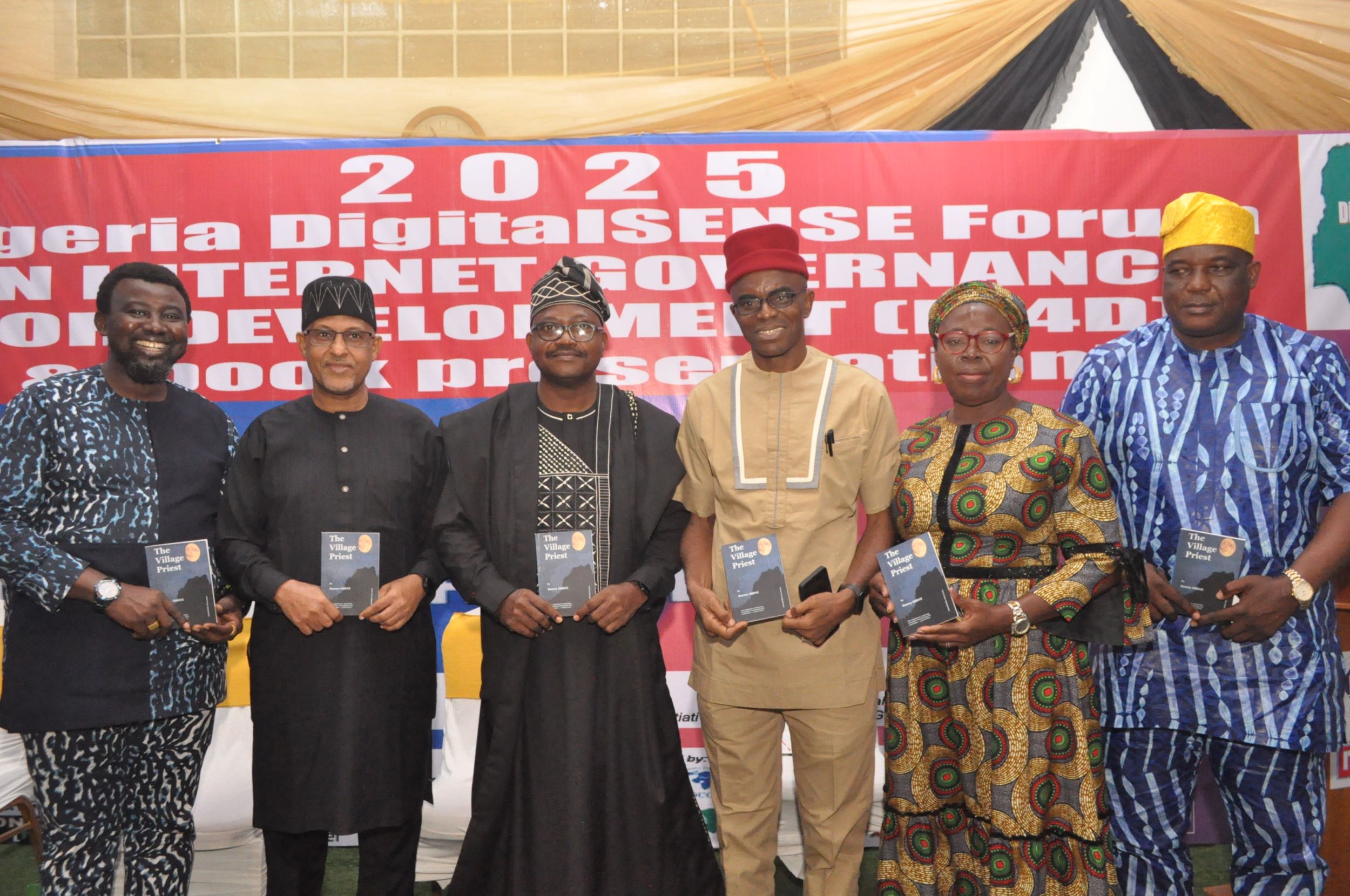Telecom
NITDA Urges Students To Be Responsible Online

Mallam Kashifu Inuwa Abdullahi, Director General, National Information Technology Development Agency, (NITDA), has admonished students of secondary schools to always display high level of responsibility whenever they are online, in other to be protected from cyber risks.

The Director General who was represented by NITDA’s Head, Digital Technology, Adoption, Digital Literacy and Skill Unit, Dr Ayodele Bakare, gave this advice in Abuja at this year’s inter-school debate organised by the Junior Chamber International, (JCI), and supported by the Agency. The topic for the debate was ‘Should Social Media Be Encouraged Among Secondary School Students?’
Mallam Abdullahi stated that, as secondary school students, using the internet facilities, it is expected of them to behave responsibly in order to be protected from psychological and physical risks that are common online.
According to the DG, some of the psychological risks the children could suffer from, if they are irresponsible online are; fear, low self-esteem, promiscuousness, violence, poor academic performance, among others.
He added that; “among the physical risks you can experience online could be illness, injury, death, vandalization, and loss of finance.”
He stated further that, “your responsibilities online include; non-disclosure of personal information to strangers, avoidance of people or strangers that demand for too much information, turn down offer to meet online strangers, not opening of mails or files from unknown sources, and always inform parents or teachers whenever you feel concerned about strangers online.”
The DG advised children to limit the time they spend online in order not to affect other sphere of their lives, particularly their academic performance.
Mallam Abdullahi maintained that child online safety has become imperative in order to protect them from threats and risks because, children are easily influenced with online contents.
He said, as government agency, NITDA will keep on with advocacy and capacity building on online safety for minors.
“Another way government is trying to protect children online is in the area of policy formulation, regulations and guideline on child online safety”, he said.
The President of JCI, Ajalat Aminat Aweke, said the aim of the debate is to discover another set of young lads among students in Federal Capital territory.
She added that the topic for the debate captures the rave of the moment on the usage of social media among secondary school students. “The debate will form a robust discussion and form a framework for censorship,” she said.
About 10 Secondary Schools participated in this year’s debate where Government Secondary School Gwagwalada emerged first and was awarded with three laptops and 100,000 naira cash award.
Government Secondary School, Mabushi, emerged second and went away with 75,000 Naira, while Government Girls Secondary School, Dutsen Alhaji, became the third winner and received 50,000 Naira award.
In the same vein, the Coordinator, National Centre for Artificial Intelligence and Robotic, (NCAIR), Mr. Ya’u Garba Isah, stated that the use of robotic would help to avoid obstacle in computing programming. He expressed this view during the second day of JCI programme supported by NITDA.
He said, mentoring the students on technological innovation would promote the motive of JCI which is in line with the mandate of the centre. The selected trainees hosted at the centre were the students that excelled at the inter school debate that JCI organised.
Telecom
Lebara, New Operator Enters Nigerian Telecom Arena, Sells Minutes, Not Airtime

Lebara Nigeria has officially stepped into Nigeria’s bustling telecom market with the introduction of its unique 0724 number series—a bold move that promises fresh competition and a more transparent user experience.

Leveraging its status as a Tier 5 Mobile Virtual Network Operator (MVNO), the company is positioning itself not just as another telecom player but as a catalyst for change, offering innovative packages built on fairness and clarity.
From day one, Lebara Nigeria has been ready to compete with industry giants like MTN, Airtel, Globacom, and 9mobile, having secured full interconnectivity with all of them.
This critical footprint ensures that its voice and data services are accessible and of high quality nationwide.
Akin Adesokan, Lebara’s chief operating officer, highlighted the company’s strategic intent: “Our readiness with the 0724 series and full interconnect setup underscores our unwavering commitment to seamless integration, customer freedom, and market inclusivity.” Indeed, the company has taken considerable steps to ensure regulatory compliance and operational strength, leveraging its global expertise as an MVNO and its freshly minted licence under the NCC’s highest tier.
What truly differentiates Lebara’s offering is its unconventional pricing model. Eschewing traditional prepaid airtime, it sells voice bundles and data packages that align with real usage, not ambiguous credit deductions. “You buy minutes, not airtime. If your call ends in 30 seconds, you still have 99 minutes and 30 seconds left. That’s the kind of clarity and control we are bringing to Nigerian telecoms,” explained Samuel Alabi, head of Corporate Communications.
This clarity responds to a long-standing frustration among Nigerians, where ₦100 airtime often disappears quickly and opaquely. Lebara’s minutes-based system offers predictability and transparency—a refreshing contrast in a market hungry for accountability.
Lebara’s entrance is more than a marketing exercise; it’s a strategic diversification of Nigeria’s mobile ecosystem.
With over 220 million active mobile lines, Nigeria is Africa’s biggest telecom consumer.
The NCC’s move to licence 41 MVNOs, including Lebara, illustrates a policy shift aimed at introducing more competition and improving service quality. Technically agile and digitally native, Lebara leverages existing network infrastructure, augmented by automated systems—a lean operation compared to the capital-intensive MNO model.
he status quo. With strategic execution and continued regulatory support, this could mark the beginning of a new chapter: one where Nigerians no longer need to ask, “Can you hear me now?” but instead say, “Yes—and I know exactly what it cost.”
Telecom
PIN Pushes for Equitable Digital Governance at World Internet Forum

As the 20th Global Internet Governance Forum (IGF) opens in Lillestrøm, Norway, leading pan-African social enterprise Paradigm Initiative (PIN) is championing grassroots voices in global digital policy discussions.

Running from June 23–27 under the theme “Building Digital Governance Together,” the IGF unites stakeholders from civil society, governments, the private sector, and technical communities to tackle pressing digital issues such as access, AI ethics, surveillance, and content moderation.
The discussions also contribute to the upcoming World Summit on the Information Society (WSIS)+20 review in December 2025.
PIN’s participation comes at a time when digital governance decisions are increasingly shaping the future of billions. “It is essential that grassroots solutions are heard,” said ‘Gbenga Sesan, Executive Director of PIN. “At PIN, we believe that meaningful digital inclusion requires more than just connectivity.
“It demands inclusive, progressive and sustainable policies and frameworks built taking the realities of grassroots stakeholders into consideration.”
Representing PIN at IGF 2025 are Sesan, Chief Operating Officer Nnenna Paul-Ugochukwu, and Senior Manager for Partnerships and Engagements Thobekile Matimbe. They will engage in strategic sessions on topics like connectivity in excluded communities, AI accountability in content moderation, and human rights in emerging tech.
The team will also participate in coordination meetings with partners including Meta, UNESCO, the Freedom Online Coalition, and GPD.
PIN’s presence at the forum underscores its ongoing mission to embed digital rights within grassroots realities and to ensure that global internet governance frameworks are inclusive, accountable, and responsive to the needs of marginalised communities.
Telecom
Remmy Nweke’s “The Village Priest” Garners High Praise from Tech Community

Information and Communications Technologies (ICT) stakeholders have applauded the latest in bookshelf by Remmy Nweke, the Village Priest, which was presented at the recently concluded Nigeria DigitalSENSE Africa Forum on Internet Governance for Development (IG4D) in Lagos.

The presentation and review of the book, “The Village Priest” by Ogbuefi Remmy Nweke, largely described as a powerful narrative explored the intersection of tradition and innovation in rural Igboland, received widespread acclaim, with its themes resonating deeply with the event’s focus on ‘Global Digital Compact: Opportunities for Multi-stakeholders in Nigeria.’
The highly anticipated review was delivered by Mr. ‘Gbenga Sesan, Executive Director of Paradigm Initiative (PIN), a renowned social entrepreneur and advocate for digital rights and inclusion in Africa.
Sesan lauded Nweke’s prose fiction for its insightful portrayal of “innovative technology adaptation transforming rural communities,” describing it as “a careful work of cultural documentation, offering not just a story but a chronicle—a record of transition that many rural and even urban African communities continue to live through.”
Sesan’s review highlighted the book’s central character, Ogboo AniEze, the revered chief priest of Ilimefo, whose life is dedicated to preserving his village’s customs. The narrative unfolds as “the village and its people, their traditional practices and strong cultural heritage at the crossroads!” with the arrival of GSM technology—a “strange and mysterious piece of technology” that initially challenges Ogboo AniEze’s traditional views.
The review detailed the chief priest’s journey of reconciliation, from initial fear of GSM eroding cultural heritage to a profound understanding that the technology “also offered opportunities for growth, development, and connection with the wider world.” This transformation leads to a new era of harmony in Ilimefo, where “tradition and modernity coexisted in balance.” The book beautifully illustrates how mobile phones become “a powerful tool for preserving the village’s cultural heritage” and how interfaith collaboration, particularly with Catholic priest Fada Ekie, fosters a “fusion of traditions” and a “new spiritual identity.”
“It teaches us, without preaching,” Sesan concluded, “that true innovation is not in abandoning our roots, but in strengthening them with new tools.”
This year’s Nigeria DigitalSENSE Forum, was presided over by Dr. Jimson Olufuye, former President of the Information Technology (Industry) Association of Nigeria and a member of the UN Secretary-General’s IGF Multistakeholder Advisory Group (MAG), served as a crucial platform for discussing the future of digital governance.
Olufuye also commended the author, Nweke for his perseverance in serving the ICT industry as well as endearing documentation of the sector.
For the Managing Director, Internet Exchange Point of Nigeria, Mr. Muhammed Rudman, the latest book by Nweke depicts the gift of in depth creativity and urged him on, despite the challenges the sectorial environment throws at industry players.
Organized by ITREALMS Media and hosted under DigitalSENSE Africa (DSA), an At-Large Structure certified by ICANN, the forum brought together key partners including the Nigerian Communications Commission (NCC), Internet Exchange Point of Nigeria, Internet Society Nigeria chapter, Association of Licensed Telecoms Operators of Nigeria (ALTON), and ICANN.
The NDSF series, running since 2009, continues to “motivate public discourse and create awareness on the technological cum business benefits of rapidly advancing technologies capable of impacting on Internet Governance, Internet Protocol (IP) addresses and domain name industry, access and affordability,” while offering a vital platform for industry networking.
The event not only celebrated the literary achievement of Ogbuefi Remmy Nweke, a multiple award-winning journalist, but also reinforced the commitment of ICT stakeholders to fostering digital inclusion and innovation across Nigeria.

 Telecom2 days ago
Telecom2 days agoMTN Says New N6.98 USSD Charge Won’t Affect Airtime Recharge

 Telecom2 days ago
Telecom2 days agoNnaemeka Ani Calls on African Techies to Rewrite the Narrative

 General News2 days ago
General News2 days agoStudy Reveals 7% of Industrial Organizations Tackle Vulnerabilities Only When Necessary

 E-Business16 hours ago
E-Business16 hours agoOver 7m Streaming Accounts’ Credentials were Leaked in 2024 – Report

 E-Financial2 days ago
E-Financial2 days agoSofri Rejigs Digital Platforms for Better Customer Experience

 E-Financial16 hours ago
E-Financial16 hours agoS&P Global Ratings Downgrades Ecobank Nigeria’s Credit Rating to CCC-, Outlook Negative

 General News2 days ago
General News2 days agoNITDA, NCFRMI Forge Strategic Alliance for Inclusive Digital Transformation of Displaced Nigerians

 Telecom16 hours ago
Telecom16 hours agoPIN Pushes for Equitable Digital Governance at World Internet Forum


























